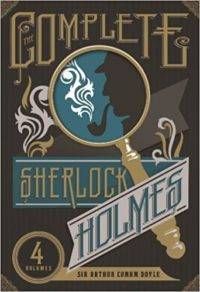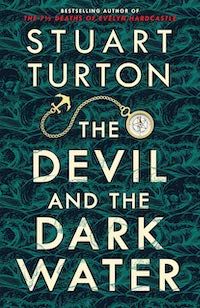When people think of detective duos, none is as quintessential as Sherlock Holmes and John Watson. Since Sherlock Holmes, many mystery writers have played off the dynamic with their detective duos in fascinating ways. The most recent iteration is Stuart Turton’s newest The Devil and The Dark Water (2020). There will be spoilers ahead.

The Quintessential Detective Duo
The dynamic of Sir Arthur Conan Doyle’s Holmes and Watson works well. Holmes is the daring, brilliant detective and Watson proves a great foil. Holmes runs around, donning disguises, inserting himself into communities and societies for knowledge and mystery.
Watson, on the other hand, isn’t not a genius; he’s intelligent but he’s often wrong in his analyses, and doesn’t quite have the flair for the dramatic as Holmes does. While he doesn’t mind his adventures with Holmes, he’s not quite as committed as Sherlock is (what with the disguises, infiltrations, contacts, and whatnot).
But he humanizes Holmes, in part because of their relationship, made much more obvious with the recent television show Sherlock, and helps us, the reading public, into Holmes’s world and his genius. “While the genius is Sherlock’s alone, without Watson, Sherlock would be less effective.”
A similar dynamic exists with R. Austin Freeman’s Dr. John Evelyn Thorndyke and his foil, Christopher Jervis. Dr. Thorndyke’s focus is more forensic than Holmes’s, but the overall dynamic is similar. Dr. Thorndyke does the heavy lifting, explaining who and how the crimes were done to Jervis, who plays a Watson like role in taking in all the data and writing it down for the public.
Reversing the Dynamic
Moving forward several decades into the 20th century, there’s another detective duo that plays with this model: Rex Stout’s Nero Wolfe. Wolfe is a genius recluse who never leaves his New York brownstone if he can help it, and his right hand man is Archie Goodwin. Goodwin runs around (along with a few other contract operatives) getting information and bringing witnesses to Wolfe to interrogate.
Wolfe is the anti-Sherlock. No doubt both are geniuses and are able to solve some of the strangest and confounding crimes. While Sherlock loved running around and inserting himself into the darker parts of life, Wolfe hates leaving his home for any reason. Unlike Sherlock, he doesn’t like to work but does it to maintain his lifestyle; Sherlock needed puzzles to occupy his mind.
Their perceptions of justice are also curious. Holmes liked collaborating with the police. Wolfe only begrudgingly does so as a means to an end in many of the stories. But Wolfe has his own sense of justice. Often in service of completing the challenge set forth by his client, Wolfe allowed extrajudicial means for achieving justice. Not that infrequently, characters who are caught by Wolfe end up taking their own lives, much to the chagrin of the police. Holmes, on the other hand, typically turned over criminals to the police in the stories.
In a reverse of Watson, Goodwin is the one who runs around on behalf of Wolfe; Holmes did his own running around. But he retains Watson-like aspects. He’s brilliant but not a genius like Wolfe, and is often perplexed at the mysteries put before him and Wolfe. He also has a way with the ladies, much like Watson who woos and marries in the course of the stories. And most importantly, he humanizes Wolfe; he forces Wolfe to take cases whether it’s for money or, more usually, for reasons of honor and pride.
Upending the Detective Duo Relationship

And then we come to Stuart Turton’s detective duo, Samuel Pipps and his bodyguard Arent Hayes in The Devil and the Dark Water. Spoilers ahead. Of course the book is so far standalone book, while Holmes, Thorndyke, and Wolfe have a healthy library of books. The book is about a merchant ship on its way to Amsterdam when horrible things start happening onboard.
In this book, Pipps is a famous detective whose exploits who have been read by people (much like Sherlock) but for reasons unknown he has been put in chains in the hold for execution when the ship arrives in Amsterdam. Arent, his bodyguard, travels on the ship and is Pipps’s unlikely heir apparent. While Arent has made a career as a mercenary, he has been training to be a detective in his own right but met with a near failure in his first case. But since his mentor is stuck in a dark hole, he’s been put in charge of stopping the horrible crimes on the ship.
No doubt Pipps is modeled after Sherlock. He can read people like Holmes and solves the hardest cases. He has his adventures written up for an adoring public. Arent is also modeled after Watson; both have fought in wars, one as a doctor, the other as a mercenary. While Holmes didn’t really work to train Watson to be his successor, Watson does try to help his friend out just as Arent is learning from Pipps to be his own detective.
Spoilers Ahoy
Here’s the real spoilers so if you have not read the book and don’t want to know more, you might want to skip the rest of this essay. Like Holmes, Pipps undergo disguises, and in this case, he pretends to have committed treason to be stuck in the prison.
But that’s where the similarities end. Even though Arent is beset by doubt throughout the book, something that doesn’t feel very Watsonian, he makes progress in the case. In fact, he’s far more capable than he is led to believe by his mentor, Pipps.
In fact, he discovers that Pipps misled him about his abilities. His first case was not a failure but Pipps had lied to him that he had found the wrong person. Instead Pipps found the criminal useful for his machinations on the ship. While Holmes and Wolfe regularly withheld information from their counterparts, outright lying was not part of their practice.
And like Wolfe, Pipps has his own sense of justice. He orchestrates this elaborate series of events to punish the perpetrators that he has sent Arent to solve. Holmes would have brought the wrongdoers to justice; Pipps wants vengeance. While Wolfe definitely has his unique sense of justice, there’s less collateral damage compared to Pipps, whose scheme shipwrecks the boat causing all manner of death and injury to the crew and passengers. At the end of the book, Arent emerges as the moral force, the real detective, while Pipps has lost the moral ground and seems tawdry by his crimes.
I can’t wait to see how other authors play with the Sherlock/Watson detective duo dynamic in the future. I hope to see some more women detective duos as well, so far I don’t know of any (though Miss Marple does work with various police inspectors and other sidekicks but it’s not a permanent position).
Admittedly, not all detective duos are comments on Holmes/Watson. I love Alexia Gordon’s Gethsemane Brown and ghost sidekick, but they have a different dynamic.
Want more Sherlock? Check out this post of Genderbent Sherlock Holmes novels or this ranking of all Sherlock Holmes stories.
